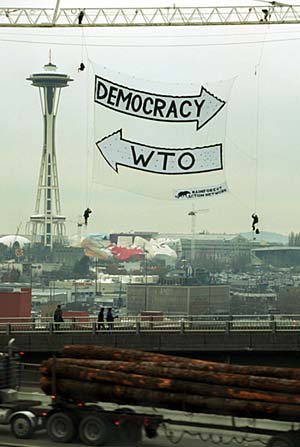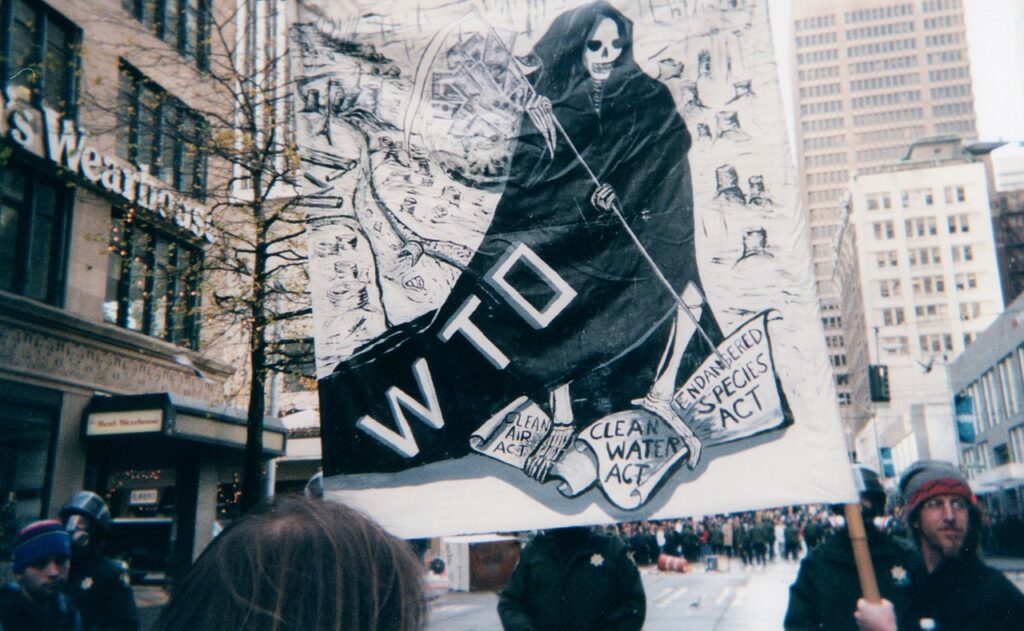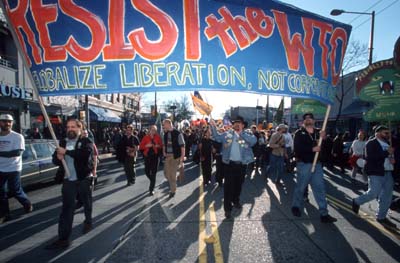An unbelievable quarter century ago, people of many believes and backgrounds came together in Seattle. They confronted the Word Trade Organization (WTO) and leaders of the western countries for their politics and the consequences for the planet and its inhabitants.

Until the Seattle meeting it had been an honour for cities to host the WTO meetings. But 1999 was a turning point. During the 1990s people involved in social movements of numerous backgrounds had formed new ties to each other. They even formed their own media, called Indymedia. And they came together in the streets of Seattle to show the WTO what they thought of their politics.

While I do not envy today’s teenager about the state of the world they have to grow up in, I cannot imagine a perfect time. The 1990’s weren’t ideal, either. After the collapse of the Soviet form of state socialism, capitalism seemed to have won – or to be the only survivor in a deadly game of non-human centred forms of government. But the politics and economics called Neo-liberalism were confronted. Today some of the same forms are often called Neocolonialism.
Different, but united

The consequences of the policies and politics of Neo-liberalism were visible in many different places. “Fruits” of the exploitation of planet and human labour were more and more visible: globally by people crippled and poisoned by working conditions, by war and deforestation, droughts and floods alike. The suffering of animals and humans in the “meat industry”. East Asian kids producing overpriced sneakers in sweatshops for Westerners – who’d maybe wear them once.
Global resistance
While companies went global in a couple of years, the resistance did not have the same funding but connections were built and renewed. And from many different backgrounds and believes, groups and individuals came to Seattle. Sea turtle savers and socialist worker organisers, anarchists media activists and Christian “Third World Imports and Information Centres”, unions and animal-right groups, militants and non-violant-activists alike.

It was a multitude of believes and forms of action that swarmed and blocked the streets of Seattle. Demonstrations and gatherings had banners, bands, and a strong believe that another world is possible.
Media & Cops

Long before the meeting most of the official media chorused the arrival of black hords, of violence, and chaos. Of danger for citizens and participants of the WTO meeting alike. When the activists arrived, some weeks before to do all the necessary work for the tens of thousands to arrive – they were met by cops. By sly undercover ones and thousands in black armours, looking like black imperial troops of science fiction movies. Reports about actions and police violence were collected and published by a new, independent media center called “Indymedia.org”. “Don’t hate the media, become the media” was their slogan long before so-called social-media became a grotesque of this slogan.
Noise and Hope

On the side of the protesters masses raised their voices in chants and song against the meeting – and against police brutality that met. Demonstrators were chased through the streets and police helicopters and the masked Infernal Noise Brigade added to the sound of Seattle.
And when some protesters made it through police lines and were in front of world leaders – non of what most of the media threatened happened: Nobody was attacked, no hand was raised. Protesters, looking shocked that they made it through all the police lines, just shouted their anger in the faces of shaken presidents and chancellors.
The united actions were confronted, stopped, hindered, and sometimes beaten to pulp. But here, between union songs and tear gas an internationally, global movement was born.
The people united may never be divided

The people united may never be divided was shouted in every city the WTO or Worldbank was meeting. No city was left alone by local and international activists. Until the meetings of the international economic organisations had to find remote and isolated places to hide from the people they made decisions for.
Seattle demonstrated that power of movements that are able to overcome differences and grow together, and if only for a week of action, is greater than any police force.
The world is in a state that needs us to decide if we want to fight each other or confront the ones who fuel climate change and global injustice. If we can learn to discuss and accept our differences but learn from places like Seattle to unite in assemblies and on the streets as well. So that we can change the world. For a better, sustainable life.